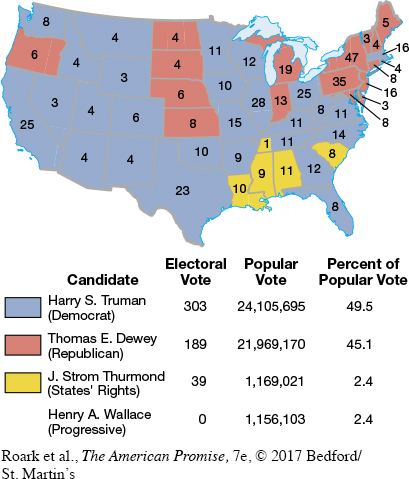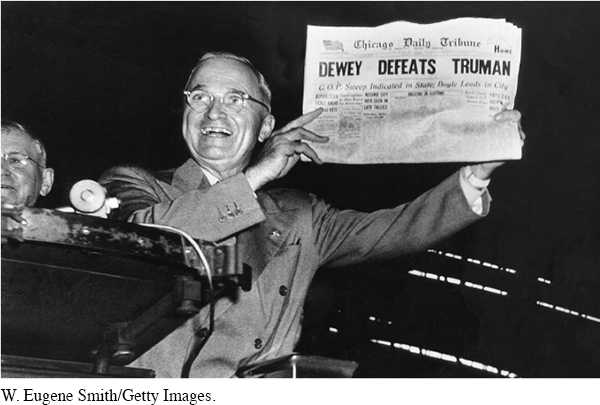The American Promise: Printed Page 761
The American Promise, Value Edition: Printed Page 689
The American Promise: A Concise History: Printed Page 788
The Fair Deal Flounders
The American Promise: Printed Page 761
The American Promise, Value Edition: Printed Page 689
The American Promise: A Concise History: Printed Page 788
Page 761Republicans capitalized on public frustrations with strikes and shortages in the 1946 congressional elections, accusing the Truman administration of “confusion, corruption, and communism.” Helen Gahagan Douglas kept her seat, but the Republicans captured control of Congress for the first time in fourteen years. Many had campaigned against the New Deal, and in the Eightieth Congress they weakened some reform programs and enacted tax cuts favoring higher-

Organized labor took the most severe blow when Congress passed the Taft-
In the 1948 elections, Truman faced not only a resurgent Republican Party headed by New York governor Thomas E. Dewey but also two revolts within his own party. On the left, Henry A. Wallace, whose foreign policy views had cost him his cabinet seat, led the new Progressive Party. On the right, South Carolina governor J. Strom Thurmond headed the States’ Rights Party—
Truman launched a vigorous campaign, yet his prospects were so bleak that on election night the Chicago Daily Tribune printed its next day’s issue with the headline “Dewey Defeats Truman.” But even though the Dixiecrats won four southern states, Truman took 303 electoral votes to Dewey’s 189, and his party regained control of Congress (Map 26.2). Truman's unexpected victory attested to the broad support for his foreign policy and the enduring popularity of New Deal reform.

While most New Deal programs survived Republican attacks, Truman failed to enact his Fair Deal agenda. Congress made modest improvements in Social Security and raised the minimum wage, but it passed only one significant reform measure. The Housing Act of 1949 authorized 810,000 units of government-
The American Promise: Printed Page 761
The American Promise, Value Edition: Printed Page 689
The American Promise: A Concise History: Printed Page 788
Page 762With southern Democrats posing a primary obstacle, Congress rejected Truman’s proposals for civil rights, a powerful medical lobby blocked plans for a universal health care program, and conflicts over race and religion thwarted federal aid to education. Truman’s efforts to revise immigration policy were mixed. The McCarran-
Truman’s concentration on foreign policy rather than domestic proposals contributed to the failure of his Fair Deal. By late 1950, the Korean War embroiled the president in controversy and depleted his power as a legislative leader (see “The Cold War Becomes Hot: Korea”). Truman’s failure to make good on his domestic proposals set the United States apart from most European nations, which by the 1950s had in place comprehensive health, housing, and employment security programs to underwrite the material well-